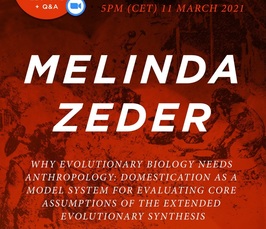Why Evolutionary Biology needs Anthropology: Domestication as a Model System for Evaluating Core Assumptions of the Extended Evolutionary Synthesis
The Past, Present and Future of the Human Niche
- Date: Mar 11, 2021
- Time: 05:00 PM - 06:00 PM (Local Time Germany)
- Speaker: Prof. Melinda Zeder
- Location: Zoom
- Host: Department of Archaeology
- Contact: richardson@shh.mpg.de

Melinda Zeder is a Senior Scientist and
Curator of Old World Archaeology in the Department of Anthropology of the
National Museum of Natural History, Smithsonian Institution. Her research
interests include the domestication plants and animals and the origins of
agriculture. Her work has also focused on the social and environmental
implications of early agriculture in the ancient Near East, and the development
of specialized subsistence economies in early complex societies. She is also
interested in the intersection of archaeology and genetics in documenting the
domestication of plant and animal species. She has worked in Iran, Israel,
Turkey, and Syria. She is the author of the book Feeding Cities: Specialized
Animal Economy in the Ancient Near East and the lead editor of the 2006
book Documenting Domestication: New Genetic and Archaeological Paradigms.
She is a Fellow of the American Association for the Advancement of Science and
a former member of the National Geographic Society Committee for Research and
Exploration. She was elected to the American Academy of Arts and Sciences in
2008 and to the National Academy of Sciences in 2012.